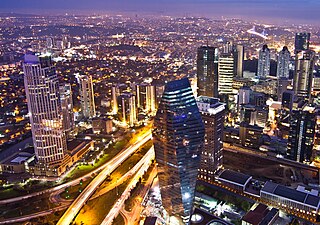Turkish construction and contracting industry
The Turkish construction and contracting industry represents one of the key sectors of Turkey's economy.

Turkish contracting in the international market
editThis section needs to be updated. (April 2021) |
During the periods in which investments slowed down in the public and private sectors, foreign contracting services gained importance. The shrinking of the economy in Turkey and the bottleneck in the construction sector resulting from it, has forced construction companies to concentrate more on business abroad.[citation needed]
The opening of the Turkish contractors to foreign markets started at the beginning of the 1970s. The first country to which Turkish contractors exported their services was Libya, where they started their projects by importing the necessary technology from European countries.[1]
Later on, the growing Turkish contracting services expanded to other foreign markets such as Iraq, Jordan, Saudi Arabia, Kuwait, the United Arab Emirates, Yemen and Iran. Particularly during the 1970s, 90% of the expatriate works undertaken were realized in Arab countries.[citation needed] Since the beginning of the 1980s, the Turkish Contractors have oriented themselves more towards the former Soviet Union countries.[citation needed] In the 1990s, due to the economic depression and the political uncertainties in the Middle Eastern and North African countries, the Turkish Contractors have focused predominantly on the Commonwealth of Independent States, Eastern Europe and Asian countries. In this framework, they have undertaken important projects in the Russian Federation, Ukraine, the Caucasus, the Central Asian Republics, Germany, Pakistan and the Far East.[1]
From the beginning of the 1970s to the end of 2022, Turkish contractors have completed more than 11,605 projects in 133 countries.[2] Their business volume abroad has reached 472 billion US Dollars in 2022.[2] The Turkish Contractors Association (TCA) currently[when?] has 139 members from Turkeys main contracting companies.[1] 90% of the members of TCA is composed of engineers and architects. These are responsible for the realisation of 70% of domestic construction works and 80% of over 4,200 projects undertaken in 69 countries.[1]
Earthquakes
editSome contractors and construction companies in Turkey have been accused of corruption for their lack of compliance with the latest safety regulations and laws, causing many deaths in earthquakes.[3]
Climate change
editTo improve the energy efficiency of buildings it has been suggested that green building principles and technologies should be applied.[4]
See also
editReferences
edit- ^ a b c d The Turkish Contractors Association Archived December 18, 2007, at the Wayback Machine
- ^ a b "Turkish International Contracting Services, 1972-2022". Turkish Contractors Association. Retrieved 14 January 2024.
- ^ "Turkey's earthquakes show the deadly extent of construction scams". The Economist. ISSN 0013-0613. Retrieved 2023-02-13.
- ^ "Enhancing Turkey's policy framework for energy efficiency of buildings, and recommendations for the way forward based on international experiences" (PDF). Buildings Performance Institute Europe and SHURA Energy Transition Center. June 2019.